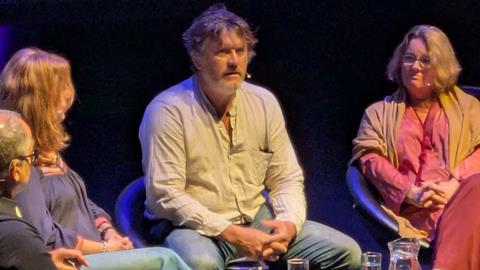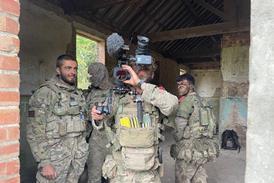Former C4 News editor says DG is not right man to make editorial judgements

Basement Films founder Ben de Pear has renewed his attack on the BBC, criticising Tim Davie personally and claiming the corporation’s journalists are being “stymied and silenced”.
A month ago, the former Channel 4 News editor lambasted the BBC for holding back his indie’s film Gaza: Medics Under Fire from being broadcast. The film had been cleared by BBC legal and compliance teams, but the corporation is delaying its release pending the result of an investigation into its Hoyo Films doc Gaza: How To Survive a Warzone, which has been pulled from iPlayer pending investigation.
Speaking at Sheffield DocFest, De Pear explicitly blamed director general Tim Davie for refusing to air the film he co-directed with Karim Shah and Ramita Navai.
“All the decisions about our film were not taken by journalists, they were taken by Tim Davie,” he told the Too Hot to Handle: The Future of Political Documentaries panel. “He is just a PR person. Tim Davie is taking editorial decisions which, frankly, he is not capable of making.
“The BBC’s primary purpose is TV news and current affairs, and if it’s failing on that it doesn’t matter what drama it makes or sports it covers. It is failing as an institution. And if it’s failing on that then it needs new management.
“Something needs to happen because they are making decisions from a PR defensive point of view rather than a journalistic one. If you make a decision on a journalistic basis you can defend it, but if you make it on a PR basis, you can’t.”
He said the decision to delay was impacting the BBC’s future ability to cover such stories and, overall, the corporation was gagging its journalists from reporting what is going on in the Middle East.
“Doctors and medics we spoke to are no longer prepared to speak to the BBC because they want their story told, not buried,” he said.
“The BBC has utterly failed. The best journalists in the world are working inside the BBC and they are being stymied and silenced.
“They are being forced to use language they don’t recognise. They are not describing something as it clearly is [for fear of impartiality] and it’s tragic.”
Broadcasters have lost their nerve on Gaza
De Pear was largely critical of British broadcasters’ coverage of the war in Gaza, with the exception of Channel 4. He also acknowledged some of the work done by Sky and ITV, but his overall verdict was damning.
“They [broadcasters] are far more worried about offending the [Israeli] government than they are offending our own. A different standard applies to [stories about Gaza] than any other story I can remember.”
He contrasted the “hundreds of thousands” of videos of events filmed from inside Gaza on social media with national news reporting.
“Everybody in the world can see what’s going on and there is a huge black hole at broadcasters and platforms. It is disgraceful. It’s flipped that whole fear that social media would somehow undermine journalism. Journalists have undermined journalism.”
He also criticised the justification used by the BBC and other broadcasters of having no sanctioned access to report on the ground from Gaza as “a big excuse.”
MORE NEWS
Dan Louw: Mr Bates impacted all broadcasters’ commissioning
“Of course, you can [report on what is happening]. Why can’t you speak to a Palestinian about their experience? It’s racism, I think,” he said, to applause from the audience.
He claimed that BBC editors, foreign correspondents and presenters are “ashamed” of the BBC coverage and have written letters of complaint to senior leaders.
De Pear and others on the panel, including Havana Marking, director of Marking Films (Undercover: Exposing the Far Right), criticised international streamers for failing in their duty to commission social impact docs.
“If Netflix released a film about Gaza it would probably be the most watched in the world because it is the most engaged subject in the world,” De Pear said. “Netflix should be funding films that reflect the what’s going on in the world. Netflix should be making films about war zones. Netflix should be taking risks. They shouldn’t just be taken safe bets on environmental films with Attenborough.”
BBC rejects characterisation
Responding to de Pear’s comments, a BBC spokesperson said the BBC “totally reject this characterisation of our coverage”.
“The BBC has continually produced powerful journalism about this conflict. Alongside breaking news and ongoing analysis, we have produced original investigations such as those into allegations of abuse of Palestinian prisoners and Israel’s use of bunker buster bombs and in-depth documentaries including the award-winning Life and Death in Gaza, and Gaza 101.”





























No comments yet